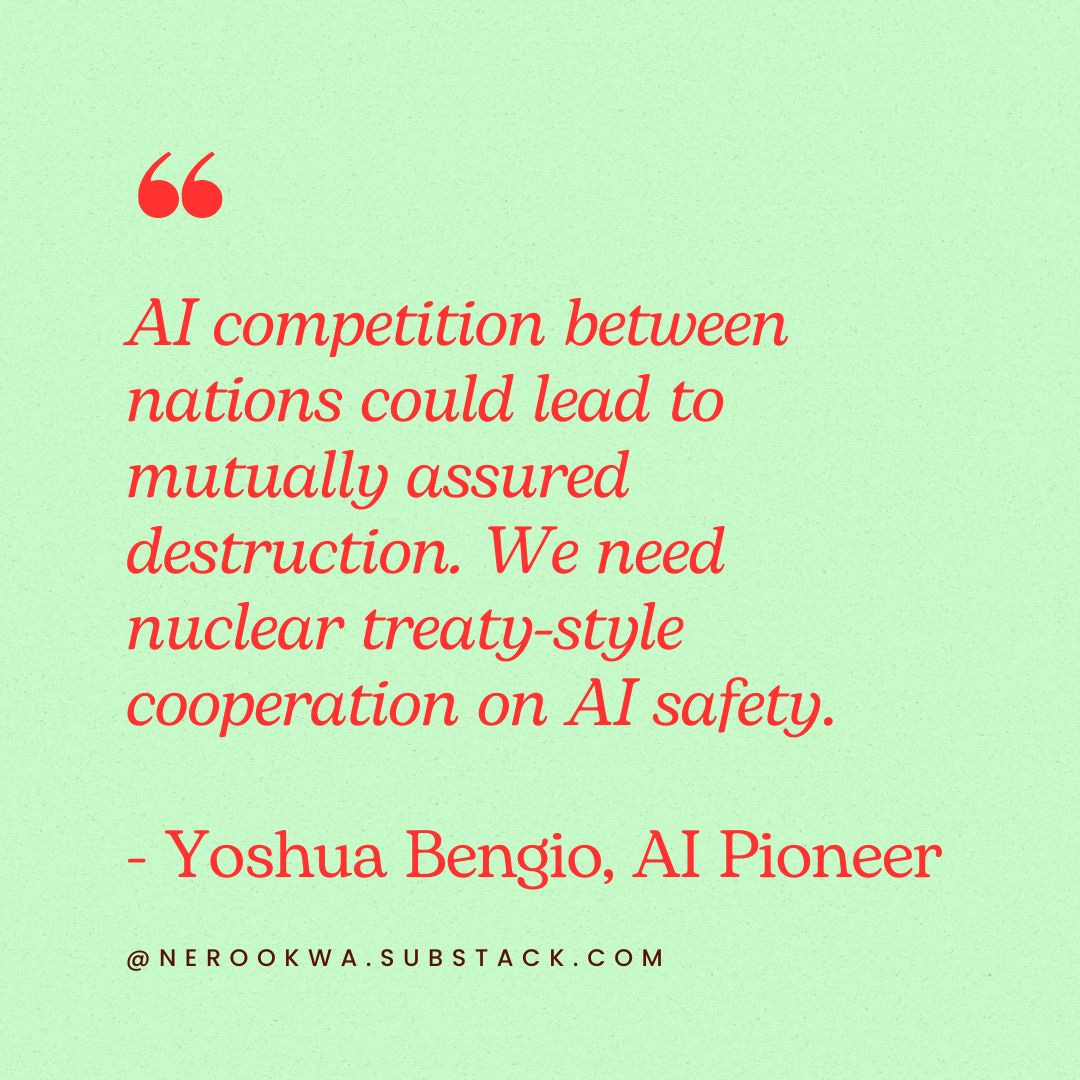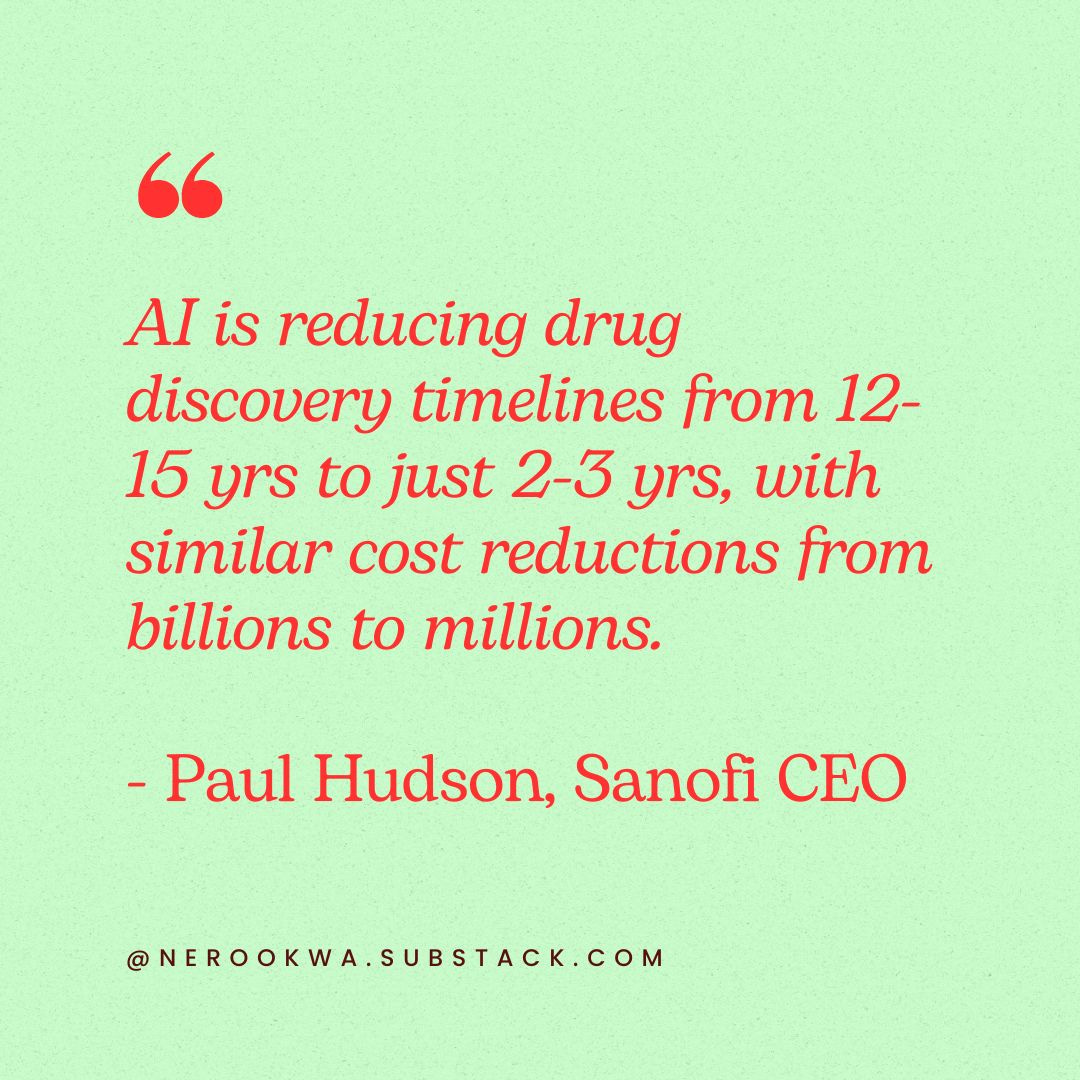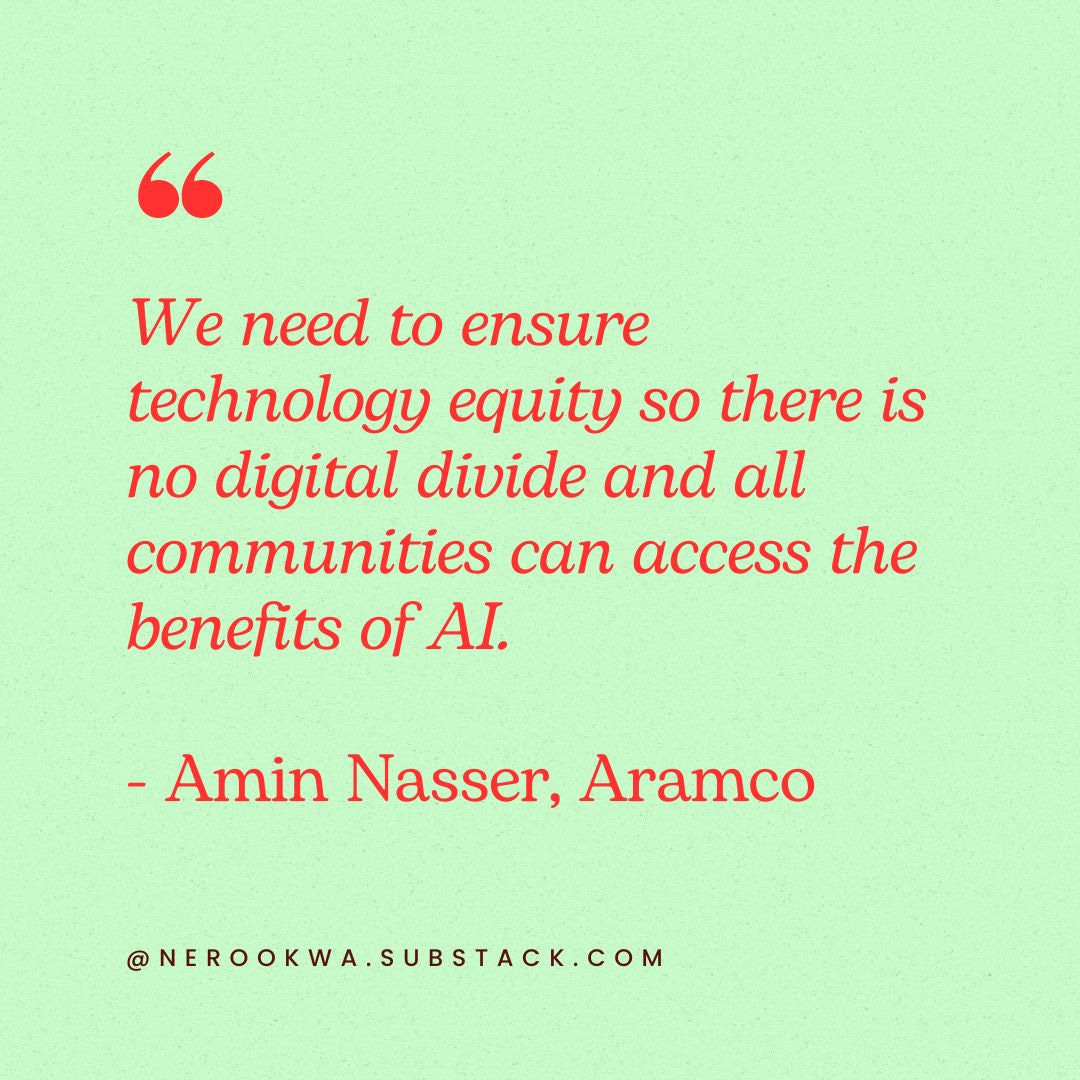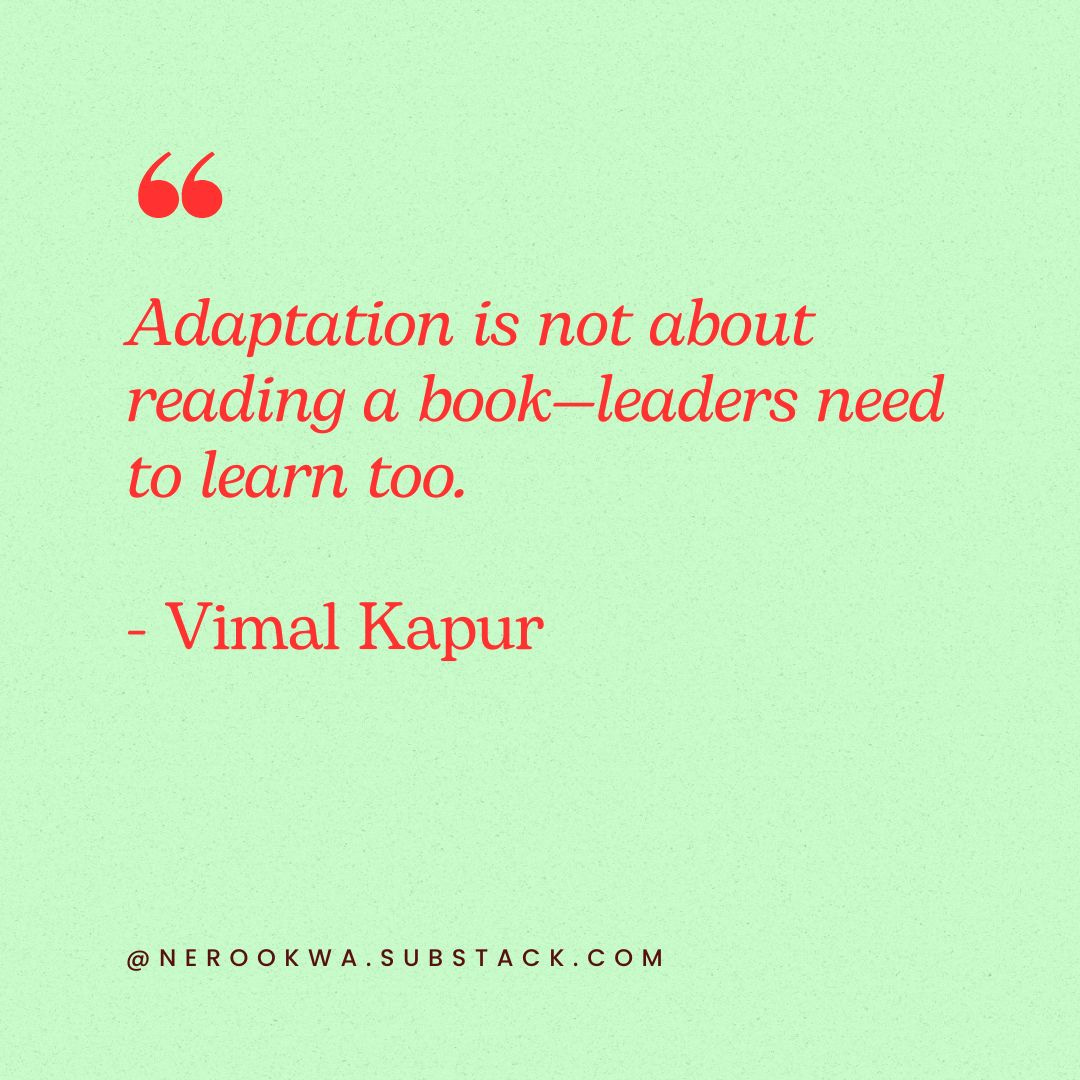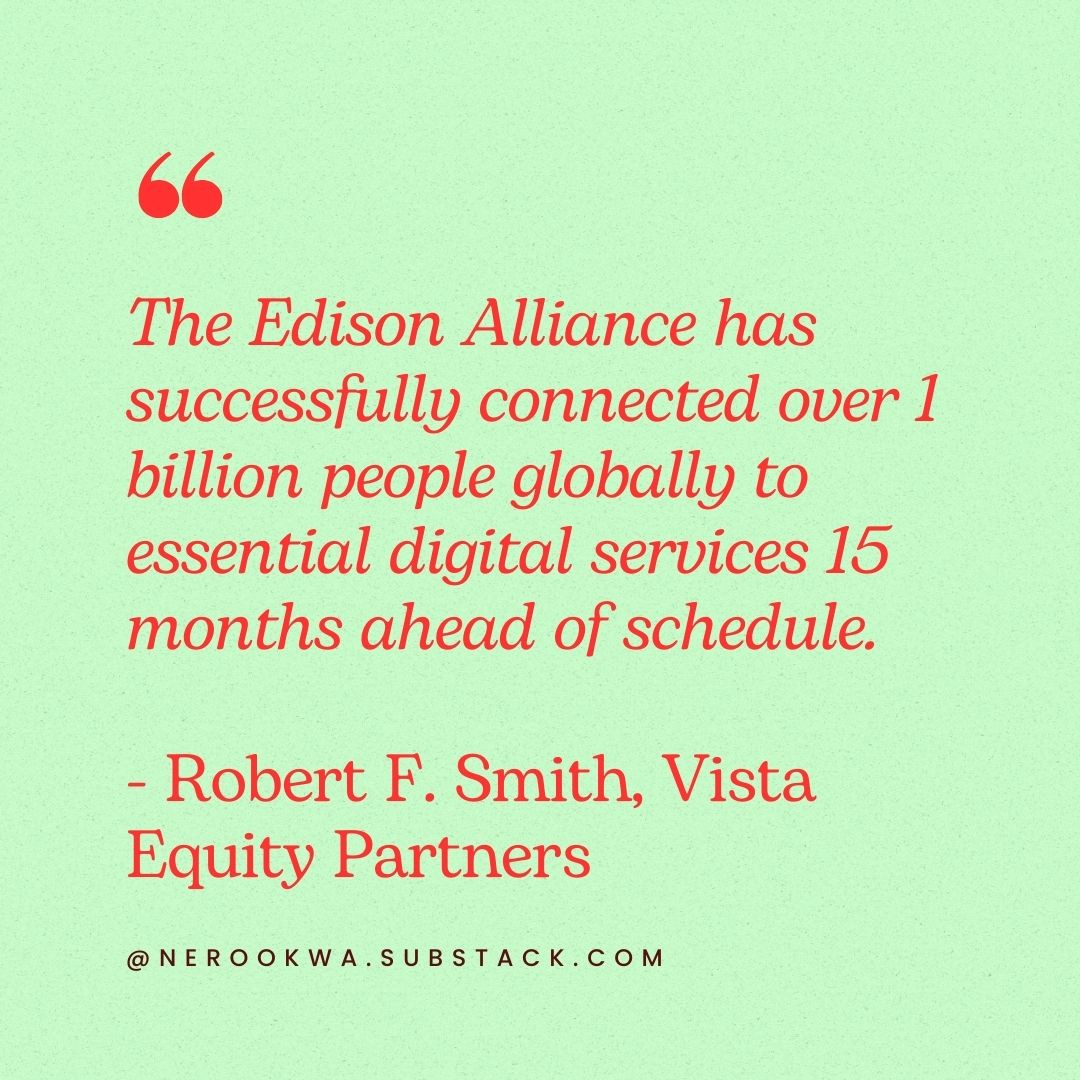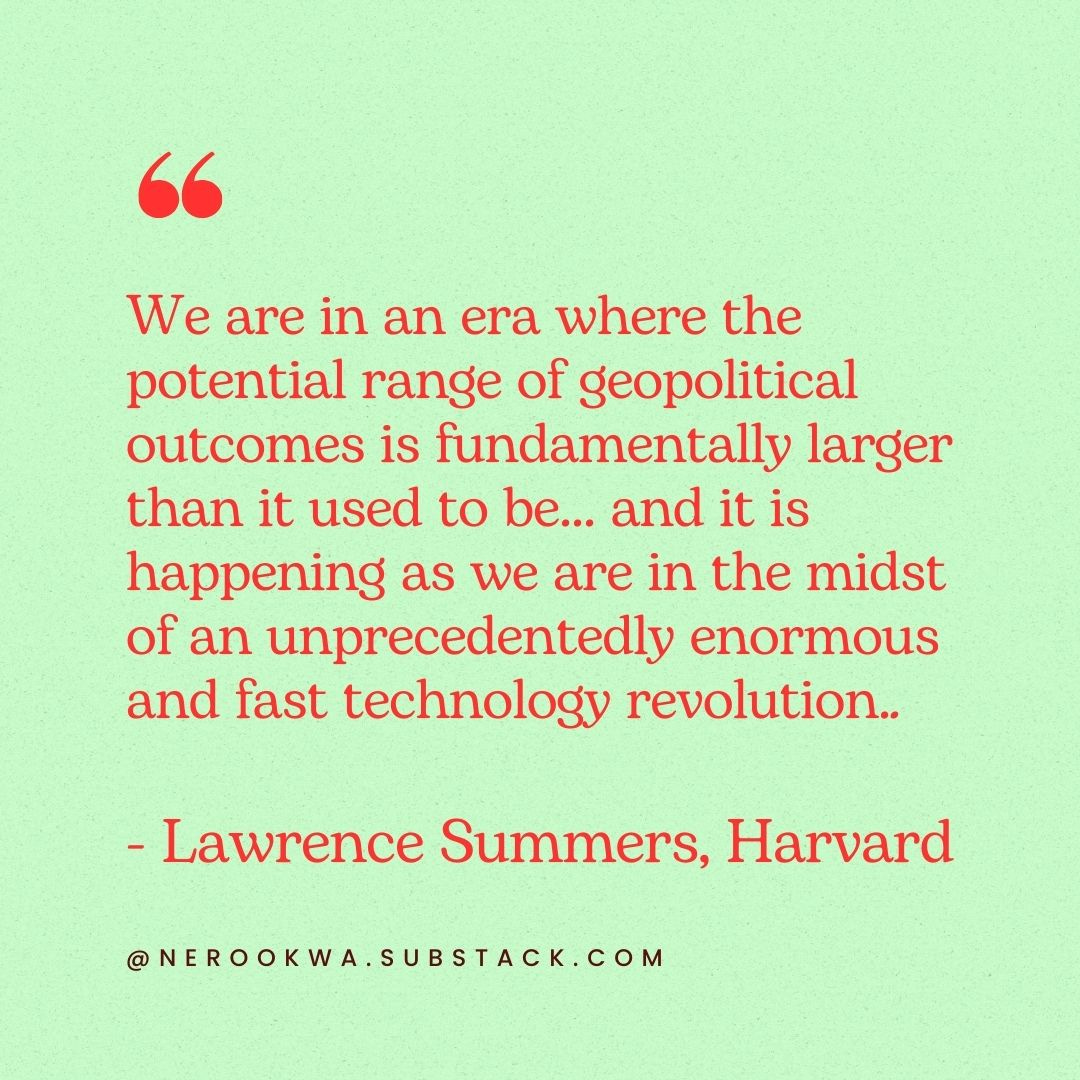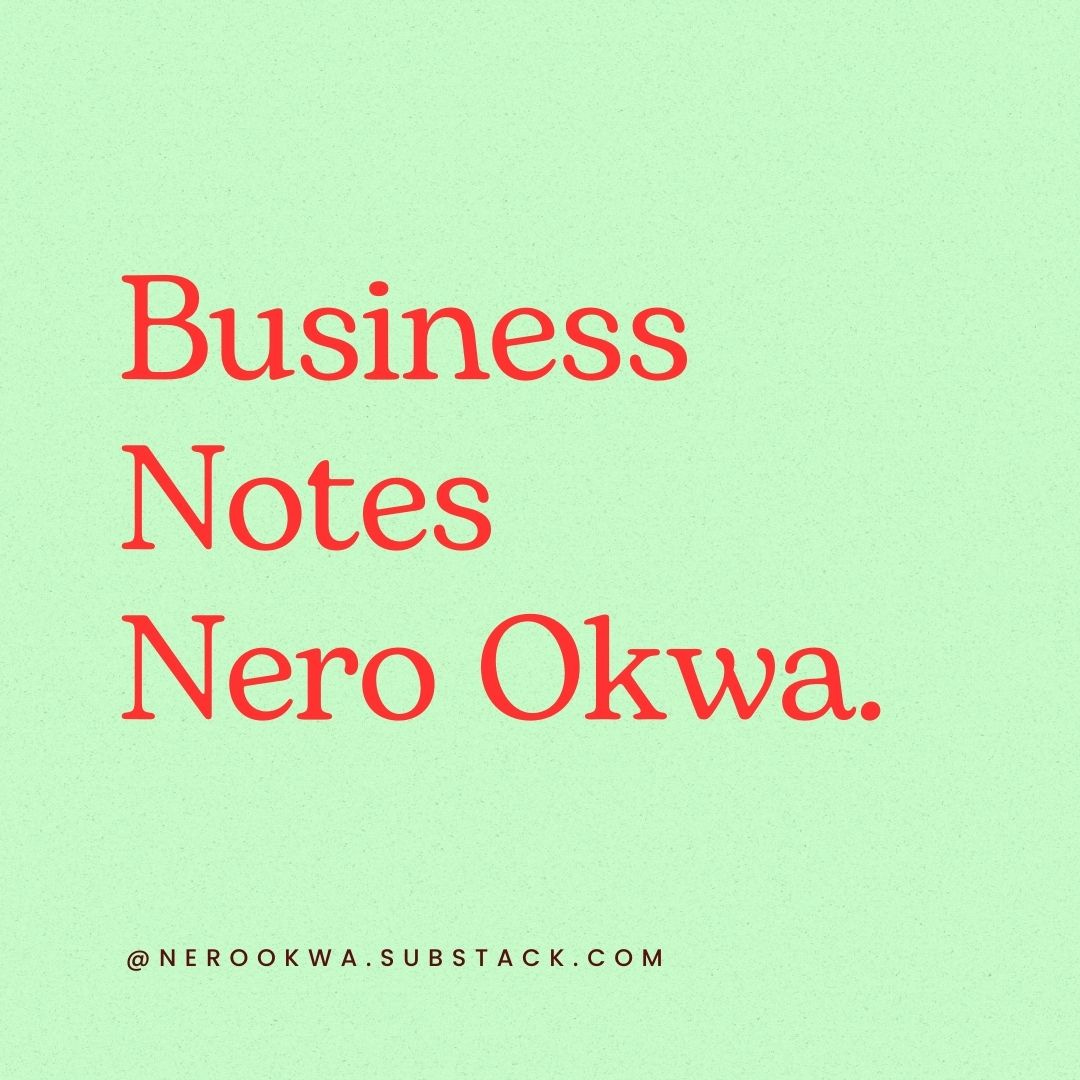#75. Davos 2025: The Intelligent Age Begins - Part 1
A Comprehensive Deep Dive into the Strategies Defining Our Next Decade

This Part 1, here is Part 2.
Dear Reader,
Every year, top decision-makers and leaders across government, business, technology, and civil society gather at the World Economic Forum Annual Meeting in Davos, Switzerland, to address major issues and define the global priorities for the year. The meeting features various panels where these leaders focus on specific topics related to the overarching theme.
At the Annual Meeting 2025 the theme was “Collaboration for the Intelligent Age”. Davos is invaluable for gauging the pulse of the global economy, and this year was no different. Significant breakthroughs in AI, the recent re-election of Donald Trump as U.S. President, and three major armed conflicts underscored a world experiencing considerable change.
On AI, the conversations were predominantly optimistic, focusing on implementation, productivity gains, and workforce reskilling. The United States also announced Stargate, a $500 billion program for investment in AI infrastructure within the U.S., in partnership with leading players like OpenAI, Oracle, Microsoft, and Softbank.
Beyond AI, discussions addressed global risks, opportunities, and trade. My favourite sessions were on Africa, exploring its demographic potential, the African Continental Free Trade Area, and the announcement of the Congo-Kivu-Kinshasa Green Corridor project.
In this newsletter edition, I summarize the key takeaways from selected sessions below. For each topic, I've included a “Strategic Implications for 2025 and Beyond” for policy makers and businesses, and “What This Means For You” section, for individuals.
Happy reading.
📻 Audio Version Available: Prefer to listen? Check out the audio recording of this article. (Disclaimer: Slight transcript variations possible)
Table of Contents
Executive Summary
The Evolving Narrative on AI
Session 1: The Dawn of AGI: Collaboration vs. Competition
Session 2: Industry Applications and Implementation Challenges
Session 3: Economic Transformation and the $20 Trillion Opportunity
Strategic Implications for 2025 and Beyond
The Human Element
Session 1: Reskilling Revolution: A $240 Billion Investment Challenge
Session 2: Digital Inclusion: Bridging the Global Divide
Session 3: Redrawing the Geography of Jobs
Strategic Implications for Organizations and Policymakers
What This Means For You in the AI Economy
Global Trade in Transition
Session 1: Special Address by South African President Cyril Ramaphosa
Session 2: US President Donald Trump's Address
Session 3: WTO Director-General on Tariffs and Trade
Strategic Implications for 2025 and Beyond
Navigating Growth and Risk
Session 1: Finding Growth in Uncertain Times
Session 2: Future of Growth
Session 3: Global Risks 2025
Strategic Implications for 2025 and Beyond
Africa at the Forefront
Session 1: Africa's Economy: Young and Fast
Session 2: Defending Earth's Largest Lung
Strategic Implications for 2025 and Beyond
What This Means For You (Young Africans)
Conclusion

Executive Summary
Davos 2025: Key Takeaways
The World Economic Forum's Annual Meeting 2025 on "Collaboration for the Intelligent Age" spotlighted five crucial developments:
AI Implementation Goes Mainstream: Discussions shifted from theoretical potential to practical implementation, with projections of AI adding up to $20 trillion to global GDP over five years
Reskilling Revolution Accelerates: With $240 billion annually invested in AI infrastructure, leadership in continuous learning and reimagining roles emerged as critical priorities
Global Trade at a Crossroads: Competing visions between multilateralism and protectionism highlighted potential GDP losses of up to $6.75 trillion if two distinct trading blocs emerge
Africa's Dual Transformation: The continent positions itself at the intersection of digital and green economies, with the AfCFTA and innovative projects like the Kivu-Kinshasa Green Corridor offering new models for sustainable development
Risks Landscape Shifts Dramatically: Armed conflict emerged as the top global risk (23%), while inequality was identified as the most interconnected challenge, affecting everything from economic stability to social cohesion
The Evolving Narrative on AI: From Promise to Practical Implementation
The World Economic Forum's Davos 2025 meeting prominently featured artificial intelligence across multiple high-profile sessions, with industry leaders, policymakers, and academics converging on critical discussions about AGI emergence, geopolitical implications, and industry transformation. Three key themes emerged across these discussions.
Session 1 - The Dawn of AGI: Collaboration vs. Competition
This panel was all about Artificial General Intelligence (AGI). A standout panel featuring experts including Andrew Ng (DeepLearning.AI), Prof. Yoshua Bengio (University of Montreal), Prof. Yejin Choi (Stanford), Jonathan Ross (Groq), and Thomas Wolf (Hugging face) debated whether we are approaching artificial general intelligence. The discussion revealed a fascinating divide in approaches.
Open vs. Closed Models: Jonathan Ross from Groq emphasized that open models will ultimately win the AI race, drawing parallels to Linux's eventual dominance in an era when open source faced scepticism
Compute as the True Battleground: Rather than models themselves being the differentiator, panellists suggested that access to computational resources will become the critical geopolitical competition point
Nuclear-Style Cooperation: Yoshua Bengio made a compelling case that AI competition between nations (particularly the US and China) could lead to mutually assured destruction, advocating for nuclear treaty-style cooperation on AI safety
Accelerationism vs. Caution: Andrew Ng advocated for accelerating AI development while simultaneously increasing safety research, arguing the net benefits of AI outweigh the risks
Session 2 - Industry Applications and Implementation Challenges
CEOs from diverse sectors including AWS, Aramco, PepsiCo, Sanofi, and Accenture discussed the practical implementation of AI across industries:
Healthcare Transformation: Paul Hudson of Sanofi revealed that AI is reducing drug discovery timelines from 12-15 years to just 2-3 years, with similar cost reductions from billions to millions
Energy Sector Applications: Aramco's CEO detailed how AI is revolutionizing seismic data analysis and grid stabilization, while addressing the $3 trillion global corrosion problem through predictive maintenance
Workforce Transformation: Multiple executives emphasized that successful AI implementation requires bridging the divide between technical and non-technical teams, with Ramon from PepsiCo emphasizing AI as a tool to empower frontline workers
Data as Competitive Advantage: Matt Garman of AWS stressed that proprietary data, securely managed, is the true differentiator for companies implementing AI
Session 3 - Economic Transformation and the $20 Trillion Opportunity
A panel featuring Brad Smith (Microsoft), Ngozi Okonjo-Iweala (WTO), Nadia Calviño (European Investment Bank) and others positioned AI as "the new electricity" with transformative economic potential:
Massive Economic Impact: Panellists projected AI could add up to $20 trillion to global GDP over the next five years
Trade Revolution: Ngozi Okonjo-Iweala pointed to WTO simulations suggesting AI adoption could increase world trade by 14% through supply chain optimization and cost reduction
Infrastructure Requirements: Peng Xiao highlighted that much of the developing world still lacks basic electrical infrastructure needed to support AI deployment, and the need for a distributed infrastructure buildout for AI, to avoid creating a potential new digital divide.)
Regional Data Zones: Brad Smith proposed an innovative model where smaller nations could collaborate to create regional "data zones" to make data centres economically viable, citing East Africa as an example. So, Kenya (50m people) may not be economical for a data centre compared to the whole of East Africa (500m people)
Strategic Implications for 2025 and Beyond
The AI Geopolitical Landscape is Shifting: While US-China competition dominates headlines, the Middle East (particularly UAE) is emerging as a significant AI power. European leaders emphasized their role in establishing ethical frameworks and trust-based systems
Regulatory Harmonization is Urgent: Brad Smith and others called for global harmonization of AI regulations to prevent fragmentation that could stifle innovation, drawing parallels to missed opportunities in electricity standardization
Data Infrastructure Becomes Critical: As AI deployments accelerate, countries and companies must strategically invest in data infrastructure or risk being left behind in the "bits vs electrons" competition
Proprietary Data is the New Oil: Organizations must recognize that their unique datasets, when properly leveraged, represent their greatest competitive advantage in the AI era
Trust as Fundamental: Multiple speakers emphasized that without establishing trust through transparency, addressing bias, and ensuring accountability, AI's potential economic benefits cannot be fully realized
The discussions at Davos 2025 signal a maturation in the AI conversation - moving beyond existential debates toward practical implementation strategies that balance innovation with responsibility. For organizations and policymakers, the message is clear: AI is no longer a future consideration but an immediate strategic imperative requiring thoughtful integration across operations, workforce planning, and global partnerships.
The Human Element: Reskilling, Digital Inclusion, and the Future Geography of Work
While much of Davos 2025 focused on AI technology itself, several critical sessions addressed the human dimension of this transformation - exploring how workers, communities, and nations can adapt to and benefit from the intelligent age.
I noticed 3 interconnected themes emerge across these discussions: reskilling for an AI-powered economy, ensuring digital inclusion for all, and understanding how job markets will evolve geographically.
Session 1 - Reskilling Revolution: A $240 Billion Investment Challenge
With businesses now investing over $240 billion annually in AI and digital infrastructure, a high-profile panel featuring executives and thought leaders including Vimal Kapur, Adam Grant, and Joe Ucuzoglu identified skills gaps as the primary barrier to unlocking AI's full potential.
Key insights included:
Beyond Technical Skills: Panellists emphasized that successful adaptation requires more than technical training—leadership depth, generalist capabilities, and emotional intelligence ("head, heart, and hand") are increasingly valuable
Learning to Learn: Rather than focusing solely on specific skills that may quickly become obsolete, organizations must cultivate cultures where continuous learning is embedded
Leadership by Example: Vimal Kapur highlighted that executive teams themselves must model learning behaviours, noting that adaptation "is not about reading a book—leaders need to learn too"
Reimagining Roles: For product-focused companies, a critical challenge involves reskilling product managers to fundamentally reimagine problems with embedded AI capabilities rather than simply applying AI to existing processes
Session 2 - Digital Inclusion: Bridging the Global Divide
This was another excellent panel featuring executive, investors and operators such as Robert F. Smith (Vista Equity Partners), Strive Masiyiwa (Econet Group), Fatoumata Bâ (Janngo Capital), and Rwanda's Minister Paula Ingabire.
The panel kicked off with a discussion of The EDISON Alliance, a World Economic Forum initiative that has successfully connected over 1 billion people globally to essential digital service in healthcare, education and finance across over 100 countries. Robert F. Smith highlighting how this was achieved 15months ahead of schedule through knowledge-sharing, local implementation, and partnerships, and the need to apply the lessons to AI.
The panel surfaced several dimensions of this challenge:
African Leadership: Strive Masiyiwa announced a new initiative building on the Edison Alliance's work to ensure AI drives growth and prosperity specifically in Africa, emphasizing the importance of African-led solutions
Gender Barriers Fatoumata Bâ detailed the triple barriers women face in digital inclusion across Africa: basic access , digital literacy, and access to capital—while showcasing her gender-equal tech fund's success in addressing these challenges
Compute Access: Rwanda's Minister Paula Ingabire described national efforts to "democratize access to compute capacity" as a foundation for building human capital in the intelligent age
Geopolitical Dimensions: Discussions touched on the potentially restrictive impact of AI chip access limitations on digital inclusion, highlighting how technology competition between major powers affects developing economies
Session 3 - Redrawing the Geography of Jobs
Panel: Prof Erika Kraemer-Mbula (University of Johannesburg), Hisayuki Idekoba (Recruit Holdings), Amy Pope (IOM), Nacho De Marco, (BairesDev), moderated by David Bach (President, IMD Business School).
A forward-looking panel explored how demographic shifts, remote work, and industrial policy will reshape where jobs are located globally over the coming decades, acknowledging that within a generation, lower-income countries will have 50% more workers than higher-income countries.
The discussion revealed several significant trends:
Demographic Pressures: Hisayuki Idekoba of Recruit Holdings presented data showing the growing dependence of developed economies on immigrant workers—90% of the US's 4 million new workers over the past five years were immigrants, with similar patterns in Canada, Australia, and European nations
Africa's Demographic Dividend: Professor Erika Kraemer-Mbula highlighted that by 2050, one-third of all working-age people will be African, creating both challenges and opportunities to position the continent as a global talent hub
Remote Work Reality Check: While remote work surged during the pandemic from 3% to 14% in the US, it has now stabilized around 7%, with panellists noting that "remote work is a privilege" primarily available to knowledge workers
Skills-Jobs Mismatch: Amy Pope from IOM highlighted stark examples of this disconnect, including the US construction sector's 0% unemployment rate despite severe housing shortages, constrained by visa policies limiting qualified workers
Informal Economy Challenge: Erika Kraemer-Mbula emphasized that 80% of employment across Africa remains informal, raising questions about how digital transformation and AI benefits can reach beyond formal sector workers, and support these informal workers in their existing jobs.
Still on the significant skills-jobs gap, particularly in developing economies, graduates are often prepared for limited white-collar roles, while vocational sectors face critical shortages. The panel called for national talent-needs studies, asking: What skills are needed now and in 10 years?
To address the future of jobs, the moderator cited the World Economic Forum's report, outlining three key strategies: facilitating migration-bringing jobs to people, expanding remote work opportunities, and investing in local job creation, especially for work that is still physical.
Strategic Implications for 2025 and Beyond: for Organizations and Policymakers
Redefine Skills Development: Organizations must move beyond narrow technical training to develop continuous learning capabilities, with leadership modelling these behaviours throughout their ranks
Regional Skills Planning: Countries need systematic approaches to map current talent pools against future needs, with particular attention to vocational skills that may be undervalued despite critical demand
Reimagine Migration Frameworks: Current visa and immigration systems are misaligned with actual labour market needs, creating economic inefficiencies and humanitarian challenges that more flexible approaches could address
Balance Remote and Local Opportunities: While remote work creates global access to some jobs, the most inclusive approach combines this with physical job creation where people already live—especially for the 30% of the global population without reliable internet access
Include the Informal Economy: Digital transformation strategies must extend beyond formal sectors to reach the vast majority of workers in developing economies who operate in informal arrangements
Address Cultural Biases: Labour shortages in essential sectors partly reflect social devaluation of certain work; societies must reconsider which jobs receive status and compensation proportionate to their importance e.g. health workers, teachers, and construction workers
What This Means For You in the AI Economy
We have talked a lot about the big picture. But what does all this mean for you? As an individual navigating the AI economy, there are some key strategies to keep in mind for 2025 and beyond.
Cultivate Learning Agility: The most valuable skill is no longer any specific technical capability but rather the ability to continuously learn, unlearn, and relearn as technologies evolve. As Adam Grant suggested at Davos, "learning to learn" is the meta-skill that underlies all others
Develop T-Shaped Expertise: The panels emphasized the increasing value of individuals who combine depth in one area with breadth across multiple domains—the "generalists" who can connect AI capabilities to real-world problems rather than specialists in narrow technical functions
Consider Geographic Arbitrage: Remote work, while not universal, creates opportunities for skilled individuals to access global labour markets while living in lower-cost regions—potentially capturing salary differentials that favour workers outside traditional economic centres
Look Beyond Traditional Education: With platforms like Udacity making education "significantly cheaper and more accessible" (as Nacho De Marco noted), credentials from non-traditional sources are increasingly valuable alternatives to conventional university pathways
Reassess Vocational Opportunities: The severe shortage of workers in sectors like construction, despite strong compensation, suggests individuals should consider vocational paths that may offer more immediate employment security than oversaturated white-collar fields
Build Digital Literacy Regardless of Role: Even in traditionally non-digital sectors, basic digital literacy is becoming essential. As Robert F. Smith highlighted, technologies like AI can enhance productivity across all job categories, not just knowledge work
Tap Into Alternative Funding Sources: For entrepreneurs in emerging markets, awareness of targeted initiatives like Fatumata Bâ's gender-equal tech fund can provide access to capital that traditional venture sources might overlook
Global Trade in Transition: Tariffs, Growth, and Geopolitics
The World Economic Forum's Annual Meeting in Davos 2025 featured crucial discussions on the evolving landscape of global trade amidst rising geopolitical tensions, protectionist policies, and the search for a more inclusive global economic system.
Three key sessions—addresses by South African President Cyril Ramaphosa, US President Donald Trump, and a panel featuring WTO Director-General Ngozi Okonjo-Iweala —provided contrasting perspectives on the future of international trade, tariff, and cooperation.
Session 1: Special Address by South African President Cyril Ramaphosa
As both the leader of South Africa and incoming chair of the G20, President Ramaphosa articulated a vision centred on multilateral cooperation with particular attention to the needs of the Global South.
His address emphasized three core themes for South Africa's G20 presidency:
Solidarity: Reforming multilateral institutions to be more representative of the world's population, ensuring "no country should be left behind"
Addressing Inequality: Focusing on equal access to opportunities for all peoples
Sustainable Development: Mobilizing finance for just energy transitions and disaster resilience
Ramaphosa highlighted specific priorities for the G20 under South Africa's leadership:
Increasing both quality and quantity of climate finance flows from developed countries
Redirecting Special Drawing Rights (SDRs) from wealthy nations to developing countries
Strengthening disaster resilience and recovery mechanisms, especially for the Global South
Harnessing critical minerals equitably for low-carbon manufacturing value chains
Supporting the African Continental Free Trade Area (AfCFTA) adjustment fund
Positioning Africa as "the engine for global growth and productivity," Ramaphosa called for G20 investment in critical areas including infrastructure, healthcare manufacturing, digitization, and AI. He urged investors to consider South Africa's economic reforms, political stability, and strategic position as "the gateway to Africa" in the context of the AfCFTA.
Session 2: US President Donald Trump's Address
President Trump presented a fundamentally different vision for trade, centred on national economic interests rather than multilateral cooperation.
His address emphasized:
Speed and Deregulation: Removing obstacles to business operations quickly
Domestic Production Incentives: A two-pronged approach to manufacturing: Lower taxes for domestic production, "even beyond previous tax cuts" and Tariffs on goods produced outside the US, projected to generate "hundreds of billions of dollars and even trillions of dollars" for the Treasury
This approach represents a significant departure from the rules-based multilateral trading system championed by the WTO and reflects a return to the "America First" trade policies of Trump's first administration.
Session 3: WTO Director-General on Tariffs and Trade
WTO Director-General Ngozi Okonjo-Iweala and EU Commissioner Valdis Dombrovskis provided an important counterpoint to rising protectionist sentiment.
Dr. Okonjo-Iweala urged leaders to "chill and not hyperventilate" about trade tensions while highlighting several critical insights:
Limitations of Tariffs: Described as "stroke of the pen policies," tariffs may address symptoms rather than underlying causes of trade imbalances, which often stem from macroeconomic fundamentals
Distortionary Effects: Tariffs can misallocate resources to industries that may not be competitive long-term
Historical Lessons: Referencing the 1930s trade wars, she warned that retaliatory tariffs could lead to: double-digit losses in global GDP if fully implemented, and potential 6-8% GDP loss ($6.75 trillion, equivalent to Japan and Korea combined) if partial retaliation creates two trading blocs
Dr. Okonjo-Iweala challenged conventional narratives about US manufacturing decline, noting that while the US lost 2.4 million manufacturing jobs to China, it created 6 million service jobs—resulting in net employment growth. She highlighted America's leadership in services, innovation, and intellectual property ($88 billion annual patent royalties) and questioned why the US isn't building on these strengths.
The session also addressed concerns about the EU’s carbon border adjustment mechanisms (CBAM), with developing nations viewing such measures as trade barriers that unfairly assign climate responsibility to countries that contributed least to historical emissions.
A crucial insight emerged regarding trade resilience: the pandemic revealed dangerous supply chain concentrations, with only 10 countries exporting 80% of the world's vaccines and China processing 70% of certain critical minerals. Dr. Okonjo-Iweala argued for reconcentration to build global resilience.
Strategic Implications for 2025 and Beyond
For Governments and Policymakers:
Managing Trade System Fragmentation: Developing nations must navigate contradictory pressures from major economic powers. Hence, regional trade agreements like AfCFTA become more critical as hedges against global uncertainty
Climate Policy and Trade Coordination: To effectively navigate the challenges of just energy transition and a climate finance gap, integrated policy frameworks that harmoniously combine trade regulations, financial mechanisms, and climate mitigation strategies are essential
Strategic Resource Management: should be applied to critical minerals policy, which is now pivotal for both climate and industrial strategies. Simultaneously, the redistribution of Special Drawing Rights presents a potentially transformative financing mechanism for developing nations, offering a significant avenue for economic and sustainable growth.
For Investors and Businesses:
Supply Chain Reconfiguration: Manufacturing location decisions now face multiple pressures: tariffs, tax incentives, and resilience concerns
Growth Sector Identification: Digital services (growing at 8% versus 5% for goods) represent opportunities less constrained by physical borders
With Davos 2025 revealing a global trade system at a critical juncture, businesses, investors, and policymakers must adapt and navigate this increasingly complex landscape with strategic foresight.
Navigating Growth and Risk in a Fragmented World
The World Economic Forum's Annual Meeting in Davos this year provided crucial insights into the global economic outlook for 2025 and beyond. Three key sessions—"Finding Growth in Uncertain Times," "Future of Growth," and "Global Risks 2025"—painted a picture of a world at an inflection point, balancing between potential accelerated growth and unprecedented risks.
Session 1 - Finding Growth in Uncertain Times
A distinguished panel featuring Ngozi Okonjo-Iweala (Director-General, WTO), Børge Brende (President, World Economic Forum), Khaldoon Khalifa Al Mubarak (Mubadala Investment Company), David M. Rubenstein (The Carlyle Group), and Marcus Wallenberg (SEB) addressed the fundamental question: How can we find paths to economic cooperation in today's challenging landscape?
The discussion highlighted several critical factors:
Divergent Growth Patterns: The global economy shows uneven recovery with the US performing better, China maintaining 5% growth, while Europe has slowed down. The IMF's forecast emphasizes "divergent" and "uncertain" as key descriptors of our current economic reality
Trade Resilience Despite Barriers: Despite trade barriers tripling through sanctions, tariffs, and subsidies, 80% of global trade still operates under WTO rules. Okonjo-Iweala (Director-General, WTO) emphasized that maintaining open and predictable markets is crucial—creating two separate trading blocs could cost the global economy a staggering $6.75 trillion (equivalent to losing Japan and Korea's economies combined)
Supply Chain Reconfiguration: There's a clear movement toward "re-globalization" rather than de-globalization, with businesses diversifying manufacturing locations to build resilience against future shocks
AI as a Growth Engine: Technology and AI adoption could potentially drive double-digit growth (up to 14%) by 2040 if implemented equitably across the world
The panel also addressed Trump's US economic agenda, with Rubenstein (The Carlyle Group) highlighting expectations of massive tax cuts, tariff implementations as negotiation tools, and a focus on lowering inflation, expanding oil and gas production, and addressing ongoing conflicts.
Session 2 - Future of Growth
With global growth projected at just 3.3% for 2025—significantly below the 4% historical average of the past 30 years—speakers including Steve Sedgwick (CNBC), Adena Friedman (CEO, Nasdaq), Faisal Alibrahim (Minister of Economy and Planning, Saudi Arabia), Lawrence H. Summers (Professor, Harvard University), and Ana Botín (Executive Chair, Banco Santander) explored pathways toward more sustainable growth aligned with national and global priorities.
The discussion revealed several key insights:
Multispeed Economic World: The panel highlighted increasing divergence in growth rates across regions, creating a multispeed global economy where some areas thrive while others struggle
Technology as Growth Driver and Disruptor: AI and emerging technologies represent significant growth opportunities but simultaneously pose challenges to labour markets and could exacerbate inequality if not managed thoughtfully
Sustainability as Economic Imperative: The transition to a sustainable economy is no longer optional—it represents both a necessity and a significant growth opportunity, with investments in green technologies and infrastructure playing a central role
Human Capital Development: In a rapidly changing world, education, skills development, and adaptability emerged as essential factors for both individual and national economic success. (see the previous section The Human Element)
Inclusive Growth Imperative: The panel stressed that growth must be broadly shared rather than concentrated among elites—a concern that ties directly to the rising social polarization identified in the Global Risks panel below
Public-Private Collaboration: Complex challenges require coordinated responses between governments and businesses to unlock new growth opportunities
Financial Stability: Maintaining stable financial systems was emphasized as foundational to sustainable growth, with the need for vigilant risk monitoring and mitigation
Session 3 - Global Risks 2025
Perhaps most sobering was the Global Risks panel featuring Kashim Shettima (Vice President, Nigeria), John Doyle (CEO of Marsh MacLennan), Martina Cheung (President, S&P Global), and Gillian Tett (Journalist and Provost Kings College, University of Cambridge).
The panel was focused on the Global Risks Report 2025 report and revealed a dramatic shift in perceived threats. The WEF's annual survey of 900 experts identified state-based armed conflict as the number one risk (at 23%), a threat that wasn't even on the list two years ago.
Meanwhile, inequality was identified as the most interconnected risk, linking to numerous other challenges.
Vice President Kashim Shettima highlighted several concerning points:
The intertwined relationship between economic and ecological challenges
The demographic pressures facing Africa (Nigeria's population alone projected to reach 440 million by 2050)
The necessity of multilateral solutions addressing poverty and gender inequality
The panel highlighted several additional critical risk factors:
Geopolitical Fragmentation: The increasing risk of conflict and fragmentation threatens global trade and investment flows, with potential knock-on effects on the global economy
Climate Change as Systemic Risk: Climate change emerged as a major systemic risk with the potential to trigger cascading crises across multiple domains simultaneously
Technological Vulnerabilities: The rapid advancement of AI and related technologies creates new risk vectors, particularly around cybersecurity threats and potential misuse
Economic Vulnerabilities: High debt levels, persistent inflation pressures, and economic inequality create structural vulnerabilities that could amplify other risks
Social Polarization: The erosion of trust in institutions and increasing polarization undermine social cohesion, creating conditions for instability
Cooperation Imperative: While the panel stressed the critical importance of international cooperation to address these interlinked challenges, they acknowledged the increasing difficulty of achieving this in a fragmenting world
Resilience Building: Developing robust resilience in infrastructure, supply chains, and social systems emerged as a crucial mitigation strategy in the face of inevitable shocks.
John emphasized technology risks, particularly the threat of systemic cyber events, while Gillian drew attention to the deeper causes of misinformation and declining institutional trust.
Her analysis pointed to a fundamental shift in how people form trust relationships—moving from traditional vertical trust in institutions to distributed lateral trust amplified by technology (e.g. Gen Z's rely on platforms like TikTok for news).
Strategic Implications for 2025 and Beyond
Here are some key strategies to keep in mind for 2025 and beyond:
Navigate the New Geoeconomics Reality: The 80-year international order is under strain. Prepare for a wider range of potential outcomes, both positive and negative, by developing scenario-based strategies that account for geopolitical fragmentation
Embrace AI Responsibly: AI implementation could add 0.5% to annual GDP growth, but requires equitable deployment, careful risk mitigation, and consideration of labour market impacts
Build System-Wide Resilience: The interconnected nature of modern risks requires thinking beyond individual supply chains to system-wide resilience—particularly around climate impacts, cyber vulnerabilities, and geopolitical tensions
Watch Africa's Demographic Dividend: With the continent potentially missing earlier industrial and digital revolutions, its youthful, digitally-savvy population represents both risk and enormous opportunity as we enter the "knowledge age"
Address Trust Deficits: The Edelman survey revealing that a majority of people harbour grievances against elites (with 40% backing violent resistance) represents a fundamental challenge to business and political leaders that cannot be ignored
Invest in Human Capital: As technological disruption accelerates, continuous skills development and adaptability become critical competitive advantages for both individuals and organizations
Prioritize Inclusive Growth: Ensuring broad participation in economic advancement is not just a social imperative but increasingly an economic and political necessity to maintain stability
Embrace Sustainability as Opportunity: The transition to sustainable business models represents one of the largest investment and innovation opportunities of the next decade
As Lawrence Summers aptly concluded:
"We are in an era where the potential range of geopolitical outcomes is fundamentally larger than it used to be... and it is happening as we are in the midst of an unprecedentedly enormous and fast technology revolution. You put those together, huge risk and also huge opportunity."
For forward-thinking organizations, navigating this landscape requires balanced risk assessment, strategic agility, and a willingness to engage with both technological transformation and fundamental social challenges.
This concludes the first part of our comprehensive analysis of the World Economic Forum's Annual Meeting 2025. The insights shared so far reveal a complex global landscape of technological innovation, economic challenges, and transformative potential.
In the next part, we'll explore Africa's pivotal role in this emerging global narrative, examining how the continent is positioning itself at the forefront of economic and technological transformation. From the African Continental Free Trade Area to ground breaking environmental initiatives, the second part will dive into the strategic opportunities and challenges facing Africa in the Intelligent Age.
Stay tuned for a deep dive into Africa's potential, key strategic implications, and a forward-looking conclusion that ties together the global insights from Davos 2025.
Here is Part 2 of this article.
Thanks for reading and bye for now.
Nero
The Best is Yet to Come





